2016-2017学年重大版英语必修一配套文档:Unit 2 Period Two 含答案
- 格式:docx
- 大小:214.63 KB
- 文档页数:13

Look Carefully and LearnMy friend Paul will never forget his first chemistry teacher.He was a little man with thick glasses.But he had a strange way of making his classes lively and interesting.And his lessons were not easily forgotten.Paul remembers one of the first lessons from this teacher.After the students were all in the chemistry lab,the teacher brought out three bottles.One was filled with petrol,one with castor oil,and one with vinegar.“Now watch carefully!” said the teacher.He then filled a cup with some of the petrol,some of the castor oil and some of the vinegar.As the students watched him quietly,he mixed the three together.After that,he held up one of his fingers and showed it to the class.He then dipped it into the cup.After a few seconds he took his finger out.“Now watch!” he said.“Remember,you must do everything as I do.”He put a finger in his mouth,tasted it and smiled,looking rather pleased.Then he handed the cup around the class of students.Each student dipped a finger into the mixture and sucked it.Instead of smiling,each of them made a face.The mixture tasted terrible.When the cup was at last returned to the teacher,he said sadly,“I’m sorry,none of you watched carefully enough.Yes,I sucked a finger,but the finger I put into my mouth was not the one I had dipped into the cup.”It was Paul’s first important lesson as a student of chemistry and he never forgot it.根据上文完成下列各题1.Paul will never forget his chemistry teacher because .A.the teacher was youngB.the teacher was very kind to himC.the teacher often made fun of themD.the teacher’s class was lively and interesting答案 D2.From the passage we can infer that .A.the teacher wondered if the students would look carefullyB.the students watched what the teacher did carefullyC.the teacher wanted the students to pay more attention in classD.the students would not like him after that答案 CPeriod One Getting Ready & ReadingⅠ.重点单词1.handsome adj.英俊的2.traditional adj.传统的3.junior adj.初级的;年少的4.crazy adj.狂热的;着迷的5.unbelievable adj.令人难以置信的;非常惊人的believe v t.相信;信任believable adj.可信的6.impress v t.给人深刻的印象7.devotion n.热爱;献身devote v t.将……奉献(给)8.explanation n.解释;说明explain v t.解释;说明9.loudness n.大声;高声;吵闹loud adj.大声的;响亮的10.musical adj.音乐般的;美妙的;悦耳的music n.音乐11.share v i.&v t.共享;分享12.humour n.幽默;诙谐humorous adj.幽默的;诙谐的13.imaginative adj.富于想象的;幻想的imagine v t.想象14.painting n.油画painter n.画家;(油)漆工paint v i./v t.画;绘画;油漆;涂颜色15.recording n.唱片;磁带record v t.记载;记录;将(声音、景象等)录下16.admire v t.钦佩,赞美17.range v i.(在……内)变化18.challenge v t.挑战;邀请比赛Ⅱ.重点短语1.quite a lot of许多2.be kind to sb./sth.对……友好;对……体贴3.be crazy about/on sb./sth.对……着迷;非常喜欢……4.change one’s attitude towards sb./sth.改变某人对……的看法5.act sth. out把……表演出来6.sense of humour幽默感7.range from...to...(范围)从……到……8.can’t wait to do sth.等不及(迫不及待)要做某事Ⅲ.好句积累1.It’s been a long time since we left our junior middle school.自从我们离开初中已经很长时间了。
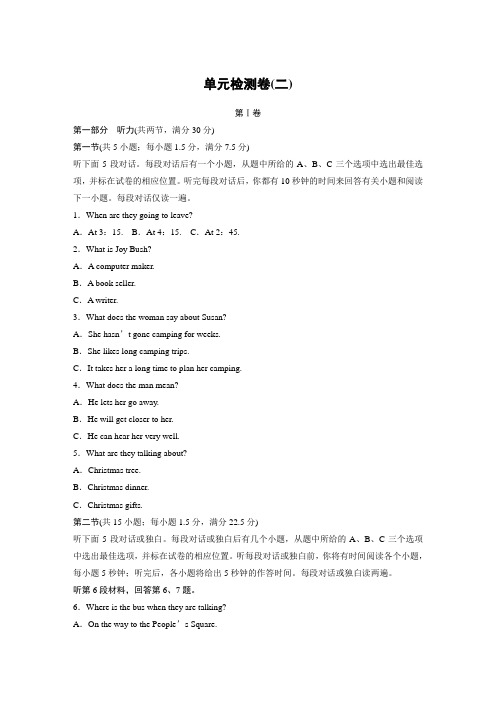
单元检测卷(二)第Ⅰ卷第一部分听力(共两节,满分30分)第一节(共5小题;每小题1.5分,满分7.5分)听下面5段对话。
每段对话后有一个小题,从题中所给的A、B、C三个选项中选出最佳选项,并标在试卷的相应位置。
听完每段对话后,你都有10秒钟的时间来回答有关小题和阅读下一小题。
每段对话仅读一遍。
1.When are they going to leave?A.At 3:15. B.At 4:15. C.At 2:45.2.What is Joy Bush?A.A computer maker.B.A book seller.C.A writer.3.What does the woman say about Susan?A.She hasn’t gone camping for weeks.B.She likes long camping trips.C.It takes her a long time to plan her camping.4.What does the man mean?A.He lets her go away.B.He will get closer to her.C.He can hear her very well.5.What are they talking about?A.Christmas tree.B.Christmas dinner.C.Christmas gifts.第二节(共15小题;每小题1.5分,满分22.5分)听下面5段对话或独白。
每段对话或独白后有几个小题,从题中所给的A、B、C三个选项中选出最佳选项,并标在试卷的相应位置。
听每段对话或独白前,你将有时间阅读各个小题,每小题5秒钟;听完后,各小题将给出5秒钟的作答时间。
每段对话或独白读两遍。
听第6段材料,回答第6、7题。
6.Where is the bus when they are talking?A.On the way to the People’s Square.B.At the People’s Square.C.At the bus stop.7.How will the man recognize the People’s Square?A.Watch for the big statue.B.Watch for it himself.C.The woman will tell him.8.What can we learn from the talk?A.The man took the bus by mistake.B.It was the first time for the man to the People’s Square.C.The bus wasn’t crowded at all.听第7段材料,回答第9至11题。

单元检测卷(四)第Ⅰ卷第一部分听力(共两节,满分30分)第一节(共5小题;每小题1.5分,满分7.5分)听下面5段对话。
每段对话后有一个小题,从题中所给的A、B、C三个选项中选出最佳选项,并标在试卷的相应位置。
听完每段对话后,你都有10秒钟的时间来回答有关小题和阅读下一小题。
每段对话仅读一遍。
1.What time is it now?A.2:45 p.m. B.3:00 p.m. C.3:15 p.m.2.What is the woman doing?A.Chatting online.B.Criticizing the man.C.Cheering the man up.3.What does the woman allow the man to do?A.To give in his homework in a couple of days.B.To see the doctor right now.C.To have a rest for two days.4.Why was the boy late for class?A.He overslept.B.He didn’t catch the bus.C.He didn’t hear the alarm clock.5.What does the woman think of coming back by sea?A.Terrible.B.Pleasant.C.Disappointing第二节(共15小题;每小题1.5分,满分22.5分)听下面5段对话或独白。
每段对话或独白后有几个小题,从题中所给的A、B、C三个选项中选出最佳选项,并标在试卷的相应位置。
听每段对话或独白前,你将有时间阅读各个小题,每小题5秒钟;听完后,各小题将给出5秒钟的作答时间。
每段对话或独白读两遍。
听第6段材料,回答第6、7题。
6.What are the speakers mainly talking about?A.Cultures. B.Countries. C.Books.7.What interests the man about China?A.The food.B.The history.C.The architecture.听第7段材料,回答8、9题。
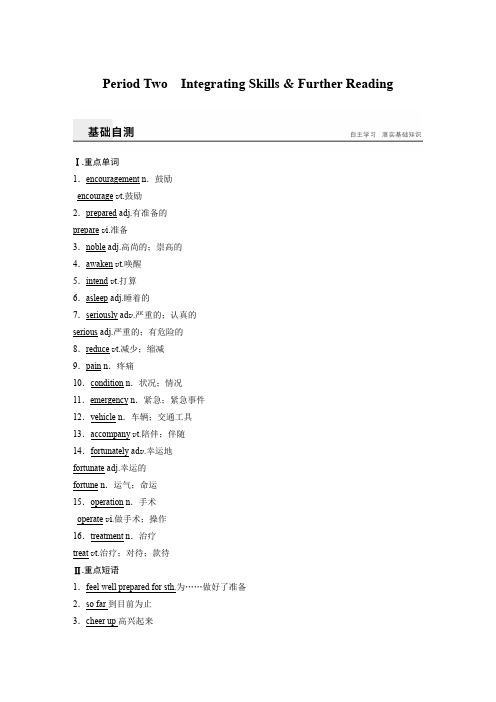
Period Two Integrating Skills & Further ReadingⅠ.重点单词1.encouragement n.鼓励encourage v t.鼓励2.prepared adj.有准备的prepare v i.准备3.noble adj.高尚的;崇高的4.awaken v t.唤醒5.intend v t.打算6.asleep adj.睡着的7.seriously ad v.严重的;认真的serious adj.严重的;有危险的8.reduce v t.减少;缩减9.pain n.疼痛10.condition n.状况;情况11.emergency n.紧急;紧急事件12.vehicle n.车辆;交通工具13.accompany v t.陪伴;伴随14.fortunately ad v.幸运地fortunate adj.幸运的fortune n.运气;命运15.operation n.手术operate v i.做手术;操作16.treatment n.治疗treat v t.治疗;对待;款待Ⅱ.重点短语1.feel well prepared for sth.为……做好了准备2.so far到目前为止3.cheer up高兴起来4.be awakened by sth.被……弄醒;被……唤醒5.intend to do sth.打算做某事6.tide sb. over sth.渡过;克服(困难等)7.in no time很快;立刻8.accompany sb.to (a place)陪同某人去……9.go through sth.经历;完成10.all kinds of...各种各样的……11.in time及时;还早12.prepare oneself for sth.为……做好准备Ⅲ.好句积累1.I was sleeping soundly last night when I was awakened by someone’s groans.昨天晚上我睡得正香,突然被某个人的呻吟声惊醒了。
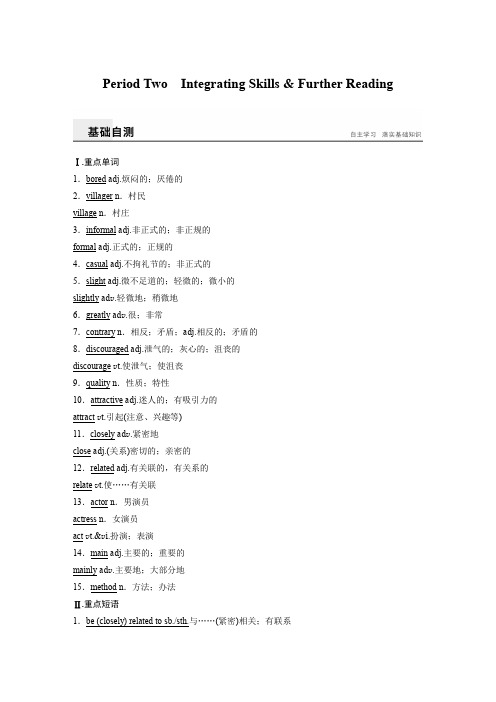
Period Two Integrating Skills & Further ReadingⅠ.重点单词1.bored adj.烦闷的;厌倦的2.villager n.村民village n.村庄3.informal adj.非正式的;非正规的formal adj.正式的;正规的4.casual adj.不拘礼节的;非正式的5.slight adj.微不足道的;轻微的;微小的slightly ad v.轻微地;稍微地6.greatly ad v.很;非常7.contrary n.相反;矛盾;adj.相反的;矛盾的8.discouraged adj.泄气的;灰心的;沮丧的discourage v t.使泄气;使沮丧9.quality n.性质;特性10.attractive adj.迷人的;有吸引力的attract v t.引起(注意、兴趣等)11.closely ad v.紧密地close adj.(关系)密切的;亲密的12.related adj.有关联的,有关系的relate v t.使……有关联13.actor n.男演员actress n.女演员act v t.&v i.扮演;表演14.main adj.主要的;重要的mainly ad v.主要地;大部分地15.method n.方法;办法Ⅱ.重点短语1.be (closely) related to sb./sth.与……(紧密)相关;有联系2.the ability to do/be sth. ……的能力3.be tolerant of sb./sth. 容忍……4.a bit of...一点儿……的味道5.(every) now and then时而;不时6.be born like...生来就像……7.deal with sth.对付;处理8.be perfect in sth.在……方面完美;精通……Ⅲ.好句积累1.She is not only very beautiful but also warm-hearted and hard-working.她不仅非常漂亮,而且热心、工作勤奋。
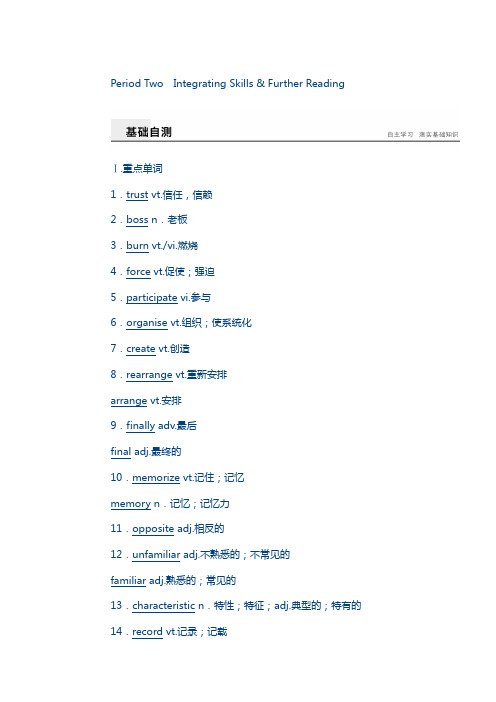
Period Two Integrating Skills & Further ReadingⅠ.重点单词1.trust vt.信任,信赖2.boss n.老板3.burn vt./vi.燃烧4.force vt.促使;强迫5.participate vi.参与6.organise vt.组织;使系统化7.create vt.创造8.rearrange vt.重新安排arrange vt.安排9.finally adv.最后final adj.最终的10.memorize vt.记住;记忆memory n.记忆;记忆力11.opposite adj.相反的12.unfamiliar adj.不熟悉的;不常见的familiar adj.熟悉的;常见的13.characteristic n.特性;特征;adj.典型的;特有的14.record vt.记录;记载record n.记录;记载;录音15.notebook n.笔记本16.suitable adj.合适的;适当的suit vt.适合17.combine vt.使联合,使结合18.native adj.本国的;土著的19.recognise vt.认出;识别20.interrupt vt.中断;打扰21.dialogue n.对话;意见交换22.frequently adv.经常地;时常frequent adj.频繁的;时常发生的Ⅱ.重点短语1.according to根据;按照2.read sth.through通读3.associate sb./sth.with sb./sth.联想;联系4.be similar in sth.在……方面相像;相似5.combine sth.with sth.使结合;联合6.try one’s best to do sth.尽力做……7.look at sth.看;考虑8.guess at sth.猜测;估计9.look for sb./sth.寻求;寻找10.look sth.up查阅;检查Ⅲ.好句积累1.As soon as the bird finished eating the rice,Jimmy found himself flying together with the bird in the sky.鸟儿一吃完大米,Jimmy发现自己和鸟儿一起在空中飞翔。
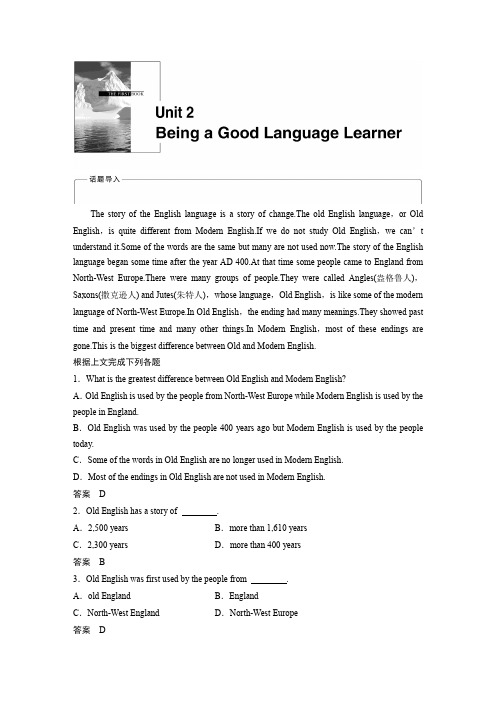
The story of the English language is a story of change.The old English language,or Old English,is quite different from Modern English.If we do not study Old English,we can’t understand it.Some of the words are the same but many are not used now.The story of the English language began some time after the year AD 400.At that time some people came to England from North-West Europe.There were many groups of people.They were called Angles(盎格鲁人),Saxons(撒克逊人) and Jutes(朱特人),whose language,Old English,is like some of the modern language of North-West Europe.In Old English,the ending had many meanings.They showed past time and present time and many other things.In Modern English,most of these endings are gone.This is the biggest difference between Old and Modern English.根据上文完成下列各题1.What is the greatest difference between Old English and Modern English?A.Old English is used by the people from North-West Europe while Modern English is used by the people in England.B.Old English was used by the people 400 years ago but Modern English is used by the people today.C.Some of the words in Old English are no longer used in Modern English.D.Most of the endings in Old English are not used in Modern English.答案 D2.Old English has a story of .A.2,500 years B.more than 1,610 yearsC.2,300 years D.more than 400 years答案 B3.Old English was first used by the people from .A.old England B.EnglandC.North-West England D.North-West Europe答案 DPeriod One Getting Ready & ReadingⅠ.重点单词1.pronunciation n.发音(法)pronounce v.发音;读音2.aloud ad v.出声地;大声地3.upset adj.心绪烦乱的;n.心烦意乱;混乱;v t.使……心烦4.comment n.注释;评论5.total adj.总的;全体的6.score n.分数;成绩;v i./v t.得分7.accurate adj.精确的8.probably ad v.大概;很可能;或许probable adj.大概的;很可能的9.somewhere ad v.在某处;n.某个地方10.relaxed adj.放松的;得到休息的;自在的11.communicate v i.交流;通话;通信12.mixture n.混合物;混合体mix v t.混合;搀和13.suggestion n.建议;意见suggest v t.建议;提出(意见、计划、理论等)14.description n.描写;叙述;记述describe v.描述15.overcome v t.克服;战胜16.observe v t.观察;观测Ⅱ.重点短语1.become aware of sth.发觉;开始意识到2.all the time一直;始终3.depend on sb./sth.取决于;由……决定4.lose interest失去兴趣;丧失兴趣5.find out查明;弄清情况6.think about sth.考虑;认为7.generally speaking通常来说;总体而言8.be divided into sth.被划分为;被分割为Ⅲ.好句积累1.Do you find it difficult to pick up more than two or three words of a dialect...?你是否觉得学会一种方言的两、三个以上的词汇比较难……?2.The aim of this quiz is to help you become aware of the fact that you have your own learning style or habits.这个小测验的目的是帮助你意识到你拥有自己的学习类型或习惯的事实。
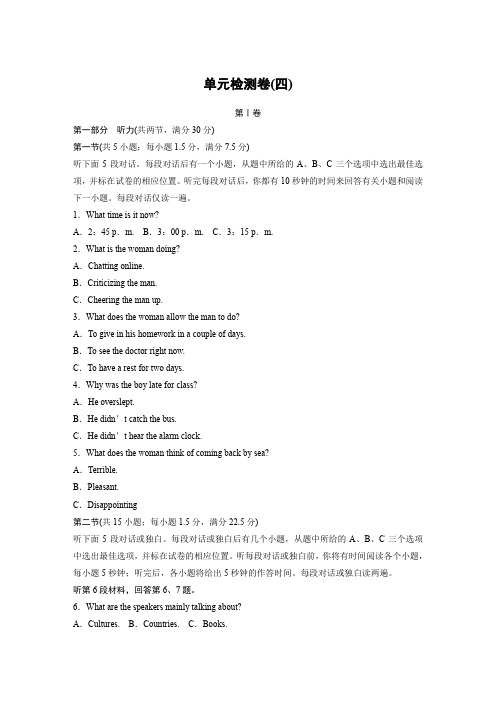
单元检测卷(四)第Ⅰ卷第一部分听力(共两节,满分30分)第一节(共5小题;每小题1.5分,满分7.5分)听下面5段对话。
每段对话后有一个小题,从题中所给的A、B、C三个选项中选出最佳选项,并标在试卷的相应位置。
听完每段对话后,你都有10秒钟的时间来回答有关小题和阅读下一小题。
每段对话仅读一遍。
1.What time is it now?A.2:45 p.m. B.3:00 p.m. C.3:15 p.m.2.What is the woman doing?A.Chatting online.B.Criticizing the man.C.Cheering the man up.3.What does the woman allow the man to do?A.To give in his homework in a couple of days.B.To see the doctor right now.C.To have a rest for two days.4.Why was the boy late for class?A.He overslept.B.He didn’t catch the bus.C.He didn’t hear the alarm clock.5.What does the woman think of coming back by sea?A.Terrible.B.Pleasant.C.Disappointing第二节(共15小题;每小题1.5分,满分22.5分)听下面5段对话或独白。
每段对话或独白后有几个小题,从题中所给的A、B、C三个选项中选出最佳选项,并标在试卷的相应位置。
听每段对话或独白前,你将有时间阅读各个小题,每小题5秒钟;听完后,各小题将给出5秒钟的作答时间。
每段对话或独白读两遍。
听第6段材料,回答第6、7题。
6.What are the speakers mainly talking about?A.Cultures. B.Countries. C.Books.7.What interests the man about China?A.The food.B.The history.C.The architecture.听第7段材料,回答8、9题。
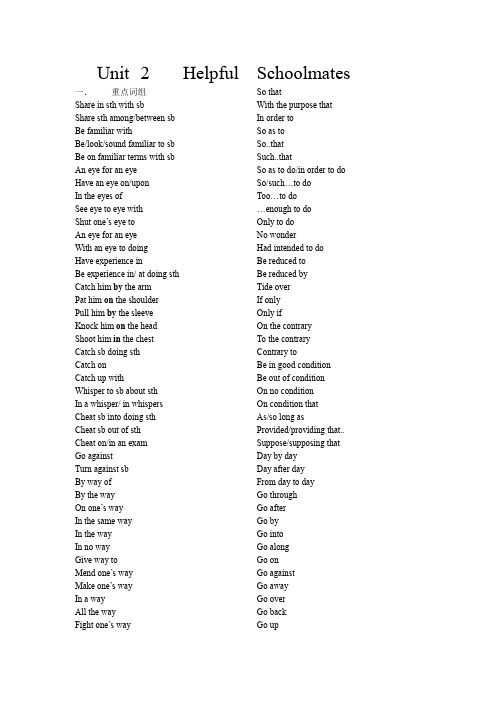
Unit 2 Helpful Schoolmates一.重点词组Share in sth with sbShare sth among/between sb Be familiar withBe/look/sound familiar to sb Be on familiar terms with sb An eye for an eyeHave an eye on/uponIn the eyes ofSee eye to eye withShut one’s eye toAn eye for an eyeWith an eye to doingHave experience inBe experience in/ at doing sth Catch him by the armPat him on the shoulderPull him by the sleeve Knock him on the head Shoot him in the chest Catch sb doing sthCatch onCatch up withWhisper to sb about sthIn a whisper/ in whispers Cheat sb into doing sth Cheat sb out of sthCheat on/in an examGo againstTurn against sbBy way ofBy the wayOn one’s wayIn the same wayIn the wayIn no wayGive way toMend one’s wayMake one’s wayIn a wayAll the wayFight one’s way So thatWith the purpose thatIn order toSo as toSo..thatSuch..thatSo as to do/in order to do So/such…to do Too…to do…enough to doOnly to doNo wonderHad intended to doBe reduced toBe reduced byTide overIf onlyOnly ifOn the contraryTo the contrary Contrary toBe in good conditionBe out of conditionOn no conditionOn condition thatAs/so long as Provided/providing that.. Suppose/supposing that Day by dayDay after dayFrom day to dayGo throughGo afterGo byGo intoGo alongGo onGo againstGo awayGo overGo backGo upGo in forGo outGo overCome throughBring throughLook throughPass throughGet throughArrange sth for sb Arrange sth to do sth Arrange for sb to do sth Arrange to do sth Arrange for sthAdd up toAdd…upAdd A to B/add A and B Add toTogether withAlong withAs well asIn addition toExcept/besides Including’Be good atBe good toBe good withBe good forOnce upon a timeAll at onceAt onceFor onceOnce moreSet upPut upTurn upFix upMake upGive upConsist ofConsist inConsist withBe made up ofBe composed of Consist with Be poor inBe worn out/be tired out Above the averageOn the average Average..outAt the top ofAt the bottom ofAt the edge ofAt the rate ofAt the cost ofAt the head ofAt the foot ofAt the risk ofAt the point ofAt the mercy ofOver and againOver and overTime and timeOnce and againTime after timeAgain and againTime and againInsist on(doing)sthInsist on sb’s doing sth Insist that clauseNot a littleQuite a littleChoose sthChoose sth for sbChoose sb as/to be Choose from/between Can’t choose but do sth Have no choice but to do sth Make a choiceBy choiceWork outWork onWork offScores ofKeep awayKeep backKeep offKeep outKeep up wihKeep out ofKeep doing sthKeep on doing sthCome toCome aboutCome acrossCome atCome backCome forthCome forwardCome inCome offCome outCome overCome upCome uponSupply sth to/for sbSupply sb with sthOffer so sthOffer sth to sbAgree withAgree toAgree onIn agreement withArrive at/come to/reach an agreementTo sb’s advantage/to the advantage of sb Take advantage of sbBe of advantage to sb/sthTurn sth to advantageHave/win an advantage overRemain to do/to be doneRemain doingRemain withA large/great/good numbr ofThe number ofA great many quite a fewMany aMuch/ a great deal of/an amount of Quantities of/a lot of/ plenty of/a quantity of /quantities ofBe particular aboutBe popular withIn particularBe familiar to sb Be similar toAt handBy handOn hand二.近义(形近)词1.wonder/wander2.destroy/damage/ruin3.situation/state/condition/position4.fortunate/lucky5.set up/put up6.finally/ at last/ in the end7.besides/except/except for/but/apart from/in addition to8.instead/instead of/in place of/ take the place of/ for9.beat/hit/strike10.finish/complete11.choose/select/elect12.score/dozen13.remain/stay/keepter/latter/lately三.语法现在分词做状语虚拟条件句Sb was doing sth whenSb was about to do sth whenSb was just going to do sth whenSb was on the point of doing sth whenSb had just done sth whenUntil /till直接引语变间接引语(II)Ⅰ.单项选择1. He asked ________ for the computer.A. did I pay how muchB. I paid how muchC. how much did I payD. how much I paid2. “Have you seen the film?”he asked me. →He asked me _______.A. had I seen the filmB. have I seen the filmC. if I have seen the filmD. whether I had seen the film3. “Please close the window,” he sai d to me. →He ______ me _____ the window.A. said to; to closeB. told to; closingC. asked ; to closeD. said to; please close4. “I am a teacher,”Jack said. →He said _________.A. that I am a teacherB. I was a teacherC. that he is a teacherD. he was a teacher5. He said, “Mother, the boy is very naughty.”→He _____- very naughty.A. said his mother that the boy wasB. said to his mother that the boy isC. told his mother that the boy wasD. spoke to his mother that the boy was6. “You’ve already got well, haven’t you?” she asked.→She asked ________.A. if I have already got well, hadn’t youB. whether I had already got wellC. have I already got wellD. had I already got well.7. He asked , “ Are yo u a Party member or a League member?”→He asked me _________.A. am I a Party member or a League memberB. was I a Party member or a League memberC. if I was a Party member or a League memberD. whether was I a Party member or a League member.8. He asked, “How are you getting along?”→He asked _______.A. how am I getting alongB. how are you getting alongC. how I was getting alongD. how was I getting along9. He asked me ________ with me.A. what the matter isB. what the mater wasC. what’s the matterD. what was the matter10. He said, “Don’t do that again.” He _____ me _______ that again.A. said to me; not to doB. said to me; don’t doC. told me; don’t doD. told me; not to do 四.作文(写日记)话题词句汇集1.exam,cheat,nervous,copy,deskmate,notice,unhappy,not..anymore,promise,realize.2.Try to do sth,prepare for sth, be unhappyabout,promise to do sth, helpsb with sth,atthat moment.3.He curled his arm around the answers sothat I couldn’t see them写作练习我考试想作弊,我的朋友没有让我抄,事后朋友找我解释,答应帮我学习。
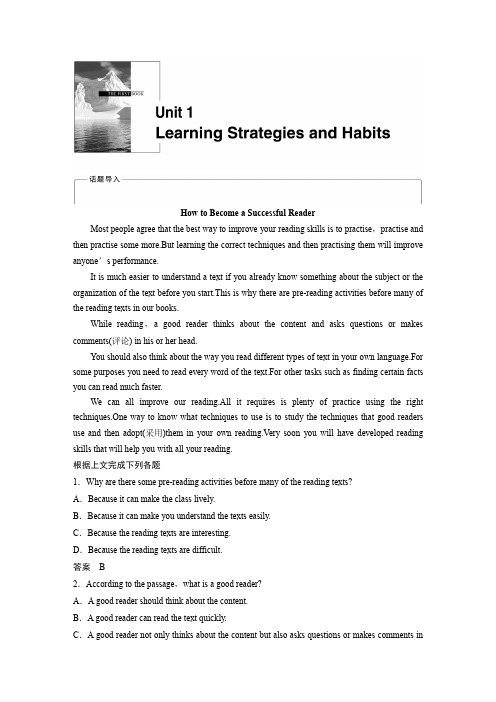
How to Become a Successful ReaderMost people agree that the best way to improve your reading skills is to practise,practise and then practise some more.But learning the correct techniques and then practising them will improve anyone’s performance.It is much easier to understand a text if you already know something about the subject or the organization of the text before you start.This is why there are pre-reading activities before many of the reading texts in our books.While reading,a good reader thinks about the content and asks questions or makes comments(评论) in his or her head.You should also think about the way you read different types of text in your own language.For some purposes you need to read every word of the text.For other tasks such as finding certain facts you can read much faster.We can all improve our reading.All it requires is plenty of practice using the right techniques.One way to know what techniques to use is to study the techniques that good readers use and then adopt(采用)them in your own reading.Very soon you will have developed reading skills that will help you with all your reading.根据上文完成下列各题1.Why are there some pre-reading activities before many of the reading texts?A.Because it can make the class lively.B.Because it can make you understand the texts easily.C.Because the reading texts are interesting.D.Because the reading texts are difficult.答案 B2.According to the passage,what is a good reader?A.A good reader should think about the content.B.A good reader can read the text quickly.C.A good reader not only thinks about the content but also asks questions or makes comments inhis or her head.D.A good reader should read more books.答案 CPeriod One Getting Ready & ReadingⅠ.重点单词1.improve v t.提高;改善2.technique n.技巧;方法3.succeed v i.成功success n.成功successful adj.成功的successfully ad v.成功地4.enjoyably ad v.愉快地enjoyable adj.令人愉快的enjoy v t.享受;喜欢5.regularly ad v.定期地;有规律地regular adj.定期的6.responsibility n.责任;职责7.discover v t.发现discovery n.发现8.fluent adj.流利的9.scare v t.惊吓;把……吓跑10.valuable adj.有价值的value n.价值;v t.重视;给……估价11.grasp v t.抓住;领会12.gradually ad v.逐渐地;渐渐地gradual adj.逐渐的;逐步的Ⅱ.重点短语1.succeed in (doing) sth.在……方面成功2.be connected to与……有联系3.get used to sth.习惯于……4.focus on sb./sth. 集中于……5.build up增强;加强6.take responsibility for sth.对……负责7.take control采取控制8.wait for sb./sth.等候;等待9.by oneself独自地;单独地10.grow up长大;成人;崛起11.feel like (doing sth.)想(做某事)12.be afraid to do sth.害怕去做某事13.ask sb.for help向……寻求帮助14.not only...but also不但……而且15.worry about sb./sth.焦虑……;担忧……Ⅲ.好句积累1.The more time you spend with the language,the faster you will learn.这门语言你花的时间越多,你就学得越快。

Period Three Grammar & Writing语法精析如果按照句子的结构分类,英文句子可分为三个类别:简单句(Simple Sentence)、并列句(Compound Sentence)和复合句(Complex Sentence)。
这里所说的结构,主要是指句子中主语和谓语之间所构成的关系。
一、简单句(Simple Sentence)简单句只有一个主谓关系。
句子可能有两个或更多的主语,也可能有两个或更多的谓语,但是句子中的主谓关系只有一个。
简单句还可以有定语、状语等句子成分。
例如:Hollywood is the most famous film-making center in the world.好莱坞是世界上最著名的电影制作中心。
He sang and danced.他既唱歌又跳舞。
二、并列句(Compound Sentence)并列句有两个或两个以上的主谓结构。
这些主谓结构之间的关系是并列的、对等的。
从语法上讲,所谓“并列”、“对等”是指任何一个主谓结构都能独立地表达意思,谁也不从属于谁。
尽管如此,这些主谓结构在意思或逻辑上有一定程度的内在联系。
否则,它们就可能被分别写成简单句,而没有必要写在一起构成并列句了。
在并列句中,要使两个或几个主谓结构(或者说,分句)连接在一起,就要用并列连词。
并列连词用来连接平行对等(即互不从属)的分句。
按其表示的不同意思有下面几种:1.表示转折意思:but,yet,however,nevertheless。
例如:Everything in the world is outside you but health belongs to yourself.一切都是身外之物,只有健康属于自己。
He has learned English for only one year,yet he can communicate with people in English.他才学一年英文,但已能用它与人交流了。
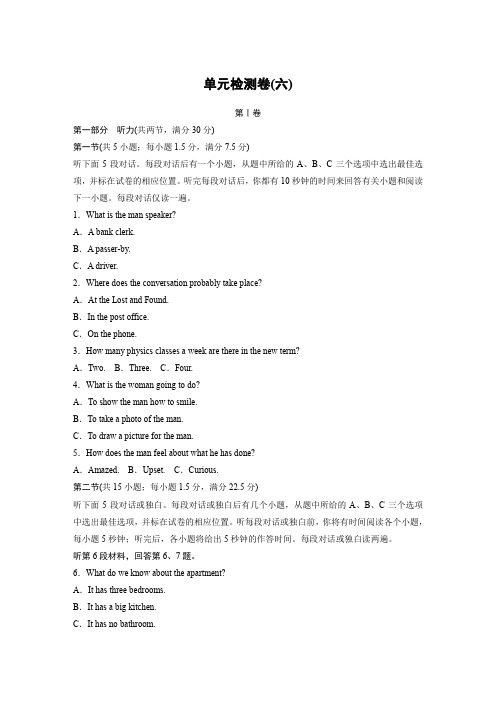
单元检测卷(六)第Ⅰ卷第一部分听力(共两节,满分30分)第一节(共5小题;每小题1.5分,满分7.5分)听下面5段对话。
每段对话后有一个小题,从题中所给的A、B、C三个选项中选出最佳选项,并标在试卷的相应位置。
听完每段对话后,你都有10秒钟的时间来回答有关小题和阅读下一小题。
每段对话仅读一遍。
1.What is the man speaker?A.A bank clerk.B.A passer-by.C.A driver.2.Where does the conversation probably take place?A.At the Lost and Found.B.In the post office.C.On the phone.3.How many physics classes a week are there in the new term?A.Two. B.Three. C.Four.4.What is the woman going to do?A.To show the man how to smile.B.To take a photo of the man.C.To draw a picture for the man.5.How does the man feel about what he has done?A.Amazed. B.Upset. C.Curious.第二节(共15小题;每小题1.5分,满分22.5分)听下面5段对话或独白。
每段对话或独白后有几个小题,从题中所给的A、B、C三个选项中选出最佳选项,并标在试卷的相应位置。
听每段对话或独白前,你将有时间阅读各个小题,每小题5秒钟;听完后,各小题将给出5秒钟的作答时间。
每段对话或独白读两遍。
听第6段材料,回答第6、7题。
6.What do we know about the apartment?A.It has three bedrooms.B.It has a big kitchen.C.It has no bathroom.7.How often does the woman want the rent to be paid?A.Once a month.B.Once every six months.C.Once every three months.8.What will the man do tomorrow?A.Wait for the woman’s call.B.Give the woman his rent.C.Take a look at the apartment.听第7段材料,回答第9至11题。
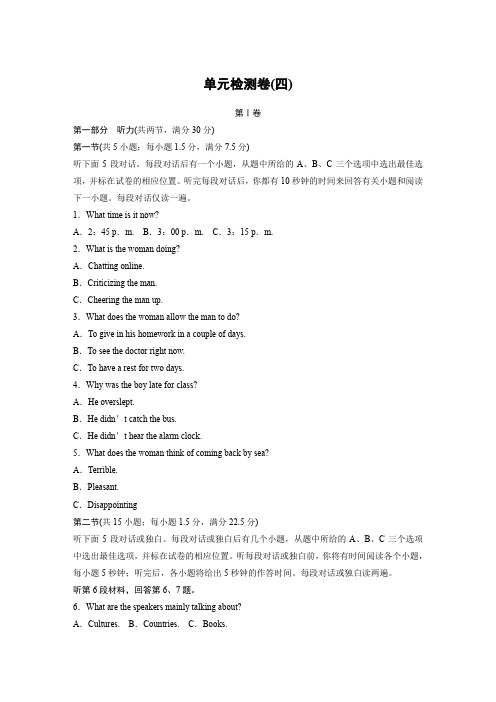
单元检测卷(四)第Ⅰ卷第一部分听力(共两节,满分30分)第一节(共5小题;每小题1.5分,满分7.5分)听下面5段对话。
每段对话后有一个小题,从题中所给的A、B、C三个选项中选出最佳选项,并标在试卷的相应位置。
听完每段对话后,你都有10秒钟的时间来回答有关小题和阅读下一小题。
每段对话仅读一遍。
1.What time is it now?A.2:45 p.m. B.3:00 p.m. C.3:15 p.m.2.What is the woman doing?A.Chatting online.B.Criticizing the man.C.Cheering the man up.3.What does the woman allow the man to do?A.To give in his homework in a couple of days.B.To see the doctor right now.C.To have a rest for two days.4.Why was the boy late for class?A.He overslept.B.He didn’t catch the bus.C.He didn’t hear the alarm clock.5.What does the woman think of coming back by sea?A.Terrible.B.Pleasant.C.Disappointing第二节(共15小题;每小题1.5分,满分22.5分)听下面5段对话或独白。
每段对话或独白后有几个小题,从题中所给的A、B、C三个选项中选出最佳选项,并标在试卷的相应位置。
听每段对话或独白前,你将有时间阅读各个小题,每小题5秒钟;听完后,各小题将给出5秒钟的作答时间。
每段对话或独白读两遍。
听第6段材料,回答第6、7题。
6.What are the speakers mainly talking about?A.Cultures. B.Countries. C.Books.7.What interests the man about China?A.The food.B.The history.C.The architecture.听第7段材料,回答8、9题。

PeriodTwo IntegratingSkills&FurtherReadingⅠ.重点单词1.weeklyadv.一星期一次;每周;adj.一星期(一次)的;每周的weekn.周;星期2.unexpectedlyadv.意想不到地;意外地;突然地expectedlyadv.预期地expectedadj.预期的expectvt.&vi.期待;预期3.flexibleadj.可通融的;灵活的4.commonlyadv.通常地;一般地5.independentlyadv.独立地;独自地independentadj.独立的;单独的independencen.独立;自立6.meansn.手段;方法7.undoubtedlyadv.确定地;毋庸置疑地doubtvt.怀疑;n.怀疑;疑问8.solvevt.解决9.benefitvi.受益10.expectationn.期待11.outcomen.结果;成果12.expressvt.表达;表示13.impatientadj.焦躁的;不耐心的patientadj.有耐心的;n.病人14.attendvt.上(大学、课等);出席15.enlargevt.扩大;使增加largeadj.大的;宽大的16.summarizevi.作总结summaryn.概要;总结Ⅱ.重点短语1.belikelytodosth.可能做;有希望做2.atthebeginningof...在……的开始3.attheendof...在……结束时4.getaccustomedtosth.习惯于……5.atleast至少6.notesth.down记录某事7.lateron后来;稍后8.inaword总之;简言之Ⅲ.好句积累1.Everytimehespeaks,hetriestobeasaccurateaspossible.他每一次说话,都试图尽量准确。
2.Keepingalearningdiaryisapossiblewaytohelpalearnertolearnindependently.保持学习日记是帮助学习者独立学习的好方法。
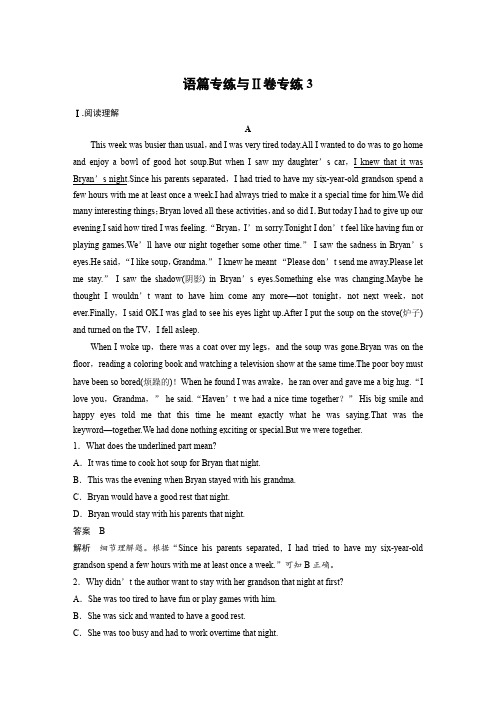
语篇专练与Ⅱ卷专练3Ⅰ.阅读理解AThis week was busier than usual,and I was very tired today.All I wanted to do was to go home and enjoy a bowl of good hot soup.But when I saw my daughter’s car,I knew that it was Bryan’s night.Since his parents separated,I had tried to have my six-year-old grandson spend a few hours with me at least once a week.I had always tried to make it a special time for him.We did many interesting things;Bryan loved all these activities,and so did I.But today I had to give up our evening.I said how tired I was feeling.“Bryan,I’m sorry.Tonight I don’t feel like having fun or playing games.We’ll have our night together some other time.” I saw the sadness in Bryan’s eyes.He said,“I like soup,Grandma.” I knew he meant “Please don’t send me away.Please let me stay.”I saw the shadow(阴影) in Bryan’s eyes.Something else was changing.Maybe he thought I wouldn’t want to have him come any more—not tonight,not next week,not ever.Finally,I said OK.I was glad to see his eyes light up.After I put the soup on the stove(炉子) and turned on the TV,I fell asleep.When I woke up,there was a coat over my legs,and the soup was gone.Bryan was on the floor,reading a coloring book and watching a television show at the same time.The poor boy must have been so bored(烦躁的)!When he found I was awake,he ran over and gave me a big hug.“I love you,Grandma,” he said.“Haven’t we had a nice time together?” His big smile and happy eyes told me that this time he meant exactly what he was saying.That was the keyword—together.We had done nothing exciting or special.But we were together.1.What does the underlined part mean?A.It was time to cook hot soup for Bryan that night.B.This was the evening when Bryan stayed with his grandma.C.Bryan would have a good rest that night.D.Bryan would stay with his parents that night.答案 B解析细节理解题。
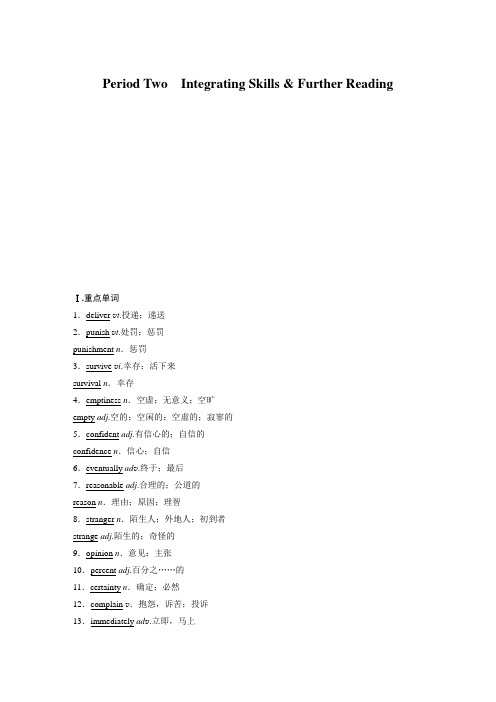
Period Two Integrating Skills & Further ReadingⅠ.重点单词1.deliver v t.投递;递送2.punish v t.处罚;惩罚punishment n.惩罚3.survive v i.幸存;活下来survival n.幸存4.emptiness n.空虚;无意义;空旷empty adj.空的;空闲的;空虚的;寂寥的5.confident adj.有信心的;自信的confidence n.信心;自信6.eventually ad v.终于;最后7.reasonable adj.合理的;公道的reason n.理由;原因;理智8.stranger n.陌生人;外地人;初到者strange adj.陌生的;奇怪的9.opinion n.意见;主张10.percent adj.百分之……的11.certainty n.确定;必然12.complain v.抱怨,诉苦;投诉13.immediately ad v.立即,马上immediate adj.立即的,即刻的;紧迫的14.talent n.才能;天才15.require v t.需要16.perform v i.表演;演出Ⅱ.重点短语1.carry on继续2.cast sb./sth. aside遗弃;抛弃3.reach out (使)伸出4.tear sth. away把……撕破;把……扯裂5.hold on (在困境或危险中)坚持住,挺住;抓紧不放6.get started开始7.provide sb.with sth.为某人提供……8.speak one’s mind说出某人的想法9.agree with sb.和……意见一致10.complain about sb./sth.抱怨;投诉11.put oneself/sb.down使(某人)自惭形秽;轻视;蔑视12.keep in touch with sb./sth.与……保持联络13.in public当众;公开地14.take up sth.开始从事15.get better at sth.在……方面变得更好;更擅长16.as time goes by随着时间的推移Ⅲ.好句积累1.Not everyone is going to agree with you but you do have the right to say what’s in your mind. 并不是每个人都会赞同你,但是你有权利说出自己的想法。

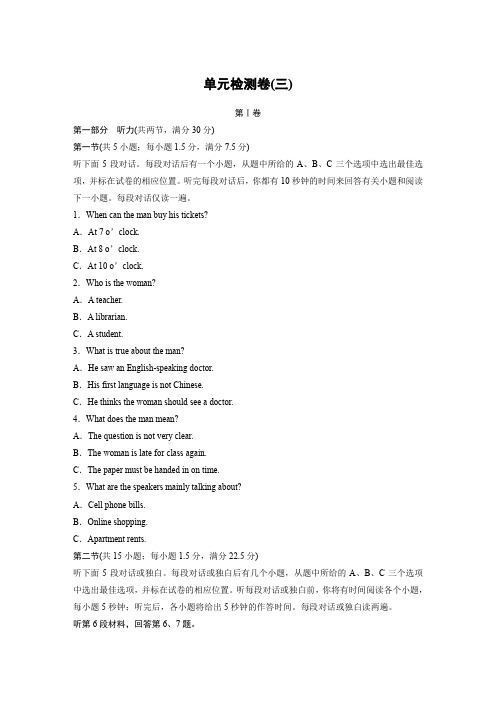
单元检测卷(三)第Ⅰ卷第一部分听力(共两节,满分30分)第一节(共5小题;每小题1.5分,满分7.5分)听下面5段对话。
每段对话后有一个小题,从题中所给的A、B、C三个选项中选出最佳选项,并标在试卷的相应位置。
听完每段对话后,你都有10秒钟的时间来回答有关小题和阅读下一小题。
每段对话仅读一遍。
1.When can the man buy his tickets?A.At 7 o’clock.B.At 8 o’clock.C.At 10 o’clock.2.Who is the woman?A.A teacher.B.A librarian.C.A student.3.What is true about the man?A.He saw an English-speaking doctor.B.His first language is not Chinese.C.He thinks the woman should see a doctor.4.What does the man mean?A.The question is not very clear.B.The woman is late for class again.C.The paper must be handed in on time.5.What are the speakers mainly talking about?A.Cell phone bills.B.Online shopping.C.Apartment rents.第二节(共15小题;每小题1.5分,满分22.5分)听下面5段对话或独白。
每段对话或独白后有几个小题,从题中所给的A、B、C三个选项中选出最佳选项,并标在试卷的相应位置。
听每段对话或独白前,你将有时间阅读各个小题,每小题5秒钟;听完后,各小题将给出5秒钟的作答时间。
每段对话或独白读两遍。
听第6段材料,回答第6、7题。
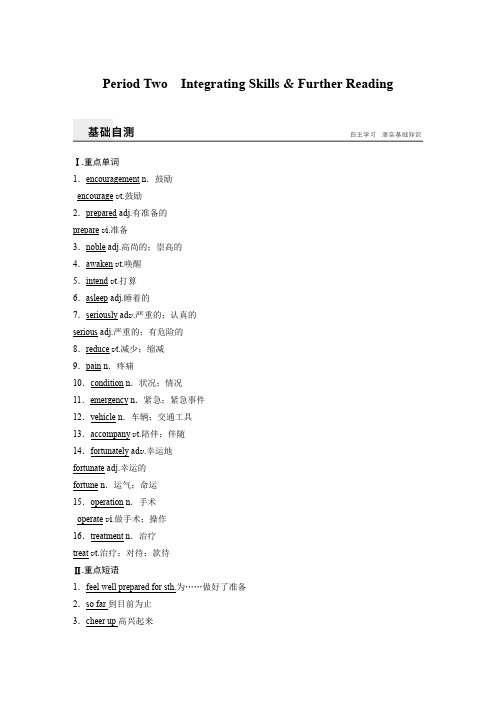
Period Two Integrating Skills & Further ReadingⅠ.重点单词1.encouragement n.鼓励encourage v t.鼓励2.prepared adj.有准备的prepare v i.准备3.noble adj.高尚的;崇高的4.awaken v t.唤醒5.intend v t.打算6.asleep adj.睡着的7.seriously ad v.严重的;认真的serious adj.严重的;有危险的8.reduce v t.减少;缩减9.pain n.疼痛10.condition n.状况;情况11.emergency n.紧急;紧急事件12.vehicle n.车辆;交通工具13.accompany v t.陪伴;伴随14.fortunately ad v.幸运地fortunate adj.幸运的fortune n.运气;命运15.operation n.手术operate v i.做手术;操作16.treatment n.治疗treat v t.治疗;对待;款待Ⅱ.重点短语1.feel well prepared for sth.为……做好了准备2.so far到目前为止3.cheer up高兴起来4.be awakened by sth.被……弄醒;被……唤醒5.intend to do sth.打算做某事6.tide sb. over sth.渡过;克服(困难等)7.in no time很快;立刻8.accompany sb.to (a place)陪同某人去……9.go through sth.经历;完成10.all kinds of...各种各样的……11.in time及时;还早12.prepare oneself for sth.为……做好准备Ⅲ.好句积累1.I was sleeping soundly last night when I was awakened by someone’s groans.昨天晚上我睡得正香,突然被某个人的呻吟声惊醒了。
Period Two Integrating Skills & Further ReadingⅠ.重点单词1.weekly ad v.一星期一次;每周;adj.一星期(一次)的;每周的week n.周;星期2.unexpectedly ad v.意想不到地;意外地;突然地expectedly ad v.预期地expected adj.预期的expect v t.& v i.期待;预期3.flexible adj.可通融的;灵活的4.commonly ad v.通常地;一般地5.independently ad v.独立地;独自地independent adj.独立的;单独的independence n.独立;自立6.means n.手段;方法7.undoubtedly ad v.确定地;毋庸置疑地doubt v t.怀疑;n.怀疑;疑问8.solve v t.解决9.benefit v i.受益10.expectation n.期待11.outcome n.结果;成果12.express v t.表达;表示13.impatient adj.焦躁的;不耐心的patient adj.有耐心的;n.病人14.attend v t.上(大学、课等);出席15.enlarge v t.扩大;使增加large adj.大的;宽大的16.summarize v i.作总结summary n.概要;总结Ⅱ.重点短语1.be likely to do sth.可能做;有希望做2.at the beginning of...在……的开始3.at the end of...在……结束时4.get accustomed to sth.习惯于……5.at least至少6.note sth.down记录某事7.later on后来;稍后8.in a word总之;简言之Ⅲ.好句积累1.Every time he speaks,he tries to be as accurate as possible.他每一次说话,都试图尽量准确。
2.Keeping a learning diary is a possible way to help a learner to learn independently.保持学习日记是帮助学习者独立学习的好方法。
3.The other day I started watching TV,so that I could get accustomed to the sound.几天前,为了能够适应它的声音我开始看电视。
4.In school it’s easy to understand what the teacher is saying,but I can’t understand while listening to English news and watching English movies.在学校,很容易听懂老师说的内容,但是当我听英语新闻和看英语电影的时候就不明白了。
Ⅰ.课文单句语法填空1.Keeping (keep) a learning diary is a possible way to help a learner to learn independently. 2.Your learning diaries could record your progress.3.If you keep such a diary,you will undoubtedly become much more aware of your learning difficulties.4.You can also benefit (beneficial) by writing on your expectations of a course at the beginning of the term.5.In a word,keeping a learning diary is a tool to help (help) you think about your learning.Ⅱ.判断正(T)误(F)1.It is not necessary to keep a learning diary in learning English.(F)2.Keeping a diary will help you become aware of your own learning difficulties.(T) 3.Keeping a diary is very useful to English learners.(T)4.The writer in Letter A can express himself in English freely.(F)5.The writer in Letter B plans to improve his speaking by preparing himself well before every lesson.(T)1.Your learning diaries could record your progress—your teacher’s marks,the ground you covered,the points you did not understand,the problems you faced,and the means you used to overcome them.你的学习日记可以记录你的进步——老师给的分数、你学习涉及的范围、你不明白的地方、你面临的问题以及你所使用的解决这些问题的方法。
[归纳拓展]means n.手段;方法by means of通过……的方法by all means尽一切办法;当然可以by no means决不,一点也不(位于句首时,句子用部分倒装)[语境感悟](1)There is no doubt that telephone is an important means of communication.毫无疑问,电话是一个重要的交流工具。
(2)Thoughts can be expressed by means of music.思想可以用音乐的方式来表达。
(3)By no means will I give up.我绝不会放弃。
[即时跟踪]用means,way,method,approach的适当形式填空(1)With this method I can easily work it out.(2)Only in this way can you find out the truth.(3)We express our thoughts by means of words.(4)We are discussing several approaches to building the bridge.2.If you keep such a diary,you will undoubtedly become much more aware of your own learning difficulties,and will be more likely to solve them.如果你这样记日记,毋庸置疑你就能更好地认识到你学习的困难,并且将更有可能解决这些问题。
[归纳拓展]undoubtedly ad v.确定地;毋庸置疑地doubt n.怀疑;疑惑;v t.怀疑;不信in doubt不确定;迷惑without/beyond doubt毫无疑问;的确no doubt无疑;确实地There is no doubt that...毫无疑问……注意(1)doubt作动词时:在肯定句中接whether/if引导的宾语从句;在否定句、疑问句中后跟that引导的宾语从句。
(2)doubt作名词时:在肯定句中接whether引导的同位语从句;在否定句中用that引导同位语从句。
[语境感悟](1)Undoubtedly he can pass the exam.毋庸置疑他能通过考试。
(2)You can complain,but I doubt if it’ll make any difference.你可以抱怨,但我看抱怨也未必有用。
(3)There is no doubt that they will agree with you on this matter.毫无疑问,他们在这件事上会同意你的。
(4)There is some doubt whether he can win the first prize.他是否能赢得一等奖还有些疑问。
[即时跟踪]用适当的连词填空(1)I don’t doubt that he can finish the task on time.(2)I doubt if/whether they can swim across the river.(3)There is no doubt that she will keep her word.(4)I have some doubt whether he will be elected.3.I will prepare “two minutes’ talk” for every lesson I have attended...我将为我上的每一节课准备两分钟的交谈内容……[归纳拓展]attend vt.上(大学、课等);出席;参加;照顾;护理attend to sb./sth.照顾,照料;处理;注意,专心[语境感悟](1)Being ill,he didn’t attend class.他生病了,所以没来上课.(2)She attended that injured policeman day and night.她日夜护理那位负伤的警察。
(3)If you don’t attend to work,you’ll not succeed.如果你不专心工作,你就不会成功。
[即时跟踪](1)用attend,join,join in,take part in的适当形式填空①My father joined a revolutionary organization in 1938.②Why didn’t you join in the talk last night?③We’ll take part in social activities during the summer vacation.④He will attend an important meeting tomorrow.(2)语法填空①—Would you like to join us in the game?—I’m afraid not,for I have something important to attend(attend) to.②You must attend to your work.1.If you keep such a diary,you will undoubtedly become much more aware of your own learning difficulties,and will be more likely to solve them.如果你这样记日记,毋庸置疑你就能更好地认识到你学习的困难,并且将更有可能解决这些问题。